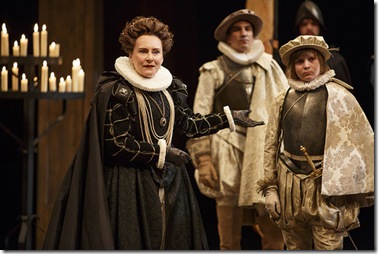Jamie Portman Reviews Stratford’s King John: Fascinating Performances Despite a Show Lacking Cohesion
PHoto. David Hou
STRATFORD — There’s no denying that Tom McCamus is delivering a fascinating portrayal of “something” at the Stratford Festival this summer.
Yet, it’s easy to be left with the feeling that it makes little sense, that this seasoned actor is resorting to a mere grab bag of emotions and mannerisms. But yet again, perhaps that’s all to the good.
After all McCamus is playing King John — or rather doing riffs on Shakespeare’s take on one of the more dubious monarchs to rule England. So if John emerges as something of a mess in McCamus’s interpretation, so be it. That’s one way of salvaging a character that often seems to lack definition in Shakespeare’s actual text.
I’m not sure whether it’s correct to say that McCamus is a source of endless delight in the production that opened Wednesday. But it’s certainly accurate to say that you can’t take your eyes off him from the moment he first shambles onto the stage of the Tom Patterson Theatre, face frozen in an inane smirk. Moments later, the smirk gives way to a scowl and an outburst of rage capable of inflicting damage on anyone in his vicinity. So you get the message — John is a volatile personality.
He’s also capricious, devious, self-pitying, pathetic, puny, frightening, cowardly, indecisive and cursed with a dangerously short attention span.
The mood swings are there to see in McCamus’s characterization. And he uses his full resources to display them. Here’s John prancing around the stage with manic glee. Here’s John huddled under the sumptuous red robe provided him by designer Carolyn M. Smith — and sobbing as though his heart will break. Here’s a helpless John, his body wracked by a seizure. And a malignant John, his deviousness in full array, commanding his loyal follower, Hubert, to murder the young prince who is a claimant to the throne.
There are also those recurring images of a king, nervously checking that his crown is firmly in place. And we all know that forbidding line — uneasy is the head that wears the crown.
Is McCamus’s performance uneasy as well? Not really. It is fragmented — but it is displaying a fragmented personality.
Besides, we shouldn’t approach Shakespeare’s earliest and most problematic history play with unrealistic expectations.
Anthony Burgess’s dismissal of the characters as “pasteboard” is typical of the critical disdain in which King John is held in some quarters. Twenty-one years ago, on this same stage, director Robin Phillips refuted that judgment with a Stratford production that offered a gallery of sharply defined human beings. And in 2004, Antoni Cimolino directed a further memorable revival.
British director Tim Carroll is less successful with this current production. He fails to secure a consistent level of acting from his cast and the play’s wayward dramatic focus seems more pronounced than ever.
The production does gather strength as the evening proceeds. There’s a gripping moment when Hubert, splendidly played by Wayne Best, struggles to summon up the willpower to murder the young Arthur, whose courage and vulnerability are fully present in Noah Jalava’s compelling performance. And the king’s final moments, bathed in the austere, candle-lit beauty of Carolyn Smith’s setting, exert their own quiet power.
But prior to intermission, there is little sense of high stakes, be they political or emotional. There’s a confrontation between McCamus’s twitchy King John and Peter Hutt’s prim and precise Philip of France that is so low-octane that it has less credibility than a pissing contest between two schoolyard males. Repeatedly, proceedings seem to lack cohesion — and the same must be said about the treatment of the play’s language, which is not well served either by declamatory outbursts or sing-song incantations.
The Patterson’s thrust stage is good for something more than impressive ceremonial entrances, which Carroll does serve up with relish, but for the most part he uses it rather dully and unimaginatively. And the production’s affection for the balcony seems rather excessive: there’s something ludicrous about a conversation happening between someone on high and others on the ground. Too often, Carroll seems to be using the balcony simply because it’s there.
There are some fine performers in the cast, but the dependable Seana McKenna still seems to be coming to terms with the role of Constance, mother of the doomed prince. Her anguish seems forced and her character undefined. Antoine Yared’s French dauphin seems more mush than pragmatism, but Patricia Collins brings a thorny honesty to the role of King John’s mother, and Brian Tree’s papal legate is the quintessential schemer.
The most consistently enjoyable performance comes fromGraham Abbey, picking his way nimbly and confidently through the occasional debris of this production, in the role of Philip the Bastard. Abbey has always had a gift for both swashbuckling charm and sardonic wit, and his portrayal of the King’s all-seeing nephew is a gift to the evening. He is the conscience of the play — and when Abbey’s Philip delivers that attack on the evils of political expediency and commodity, we get a powerful glimpse of the production this might have been.
(King John continues to Sept. 20. Ticket information at 1 800 567 1600)
